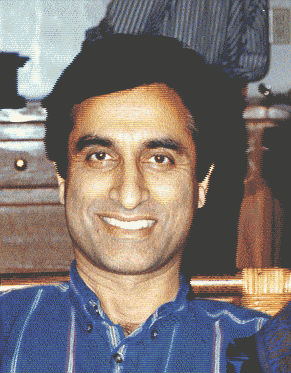|
The Kashmiri Poet of Louisiana
by Anwar Shaikh |
Emotion is the basic characteristic of a poet
because a good verse cannot come into being until he feels a touch of
excitement. Though emotion is one of the three groups of the phenamena of the
mind, that is, cognition, will and feeling, it is the exuberance and refinement
of feeling, which gives birth to tasteful and elegant poetry. However, nature
has been generous to Subhash Kak of Louisiana; he originally comes from the
Valley of Kashmir, whose natural scenery testifies to the fact that the Creator
made this tract of land with the materials, which may be termed as marvel,
mystery and munificence. This young man's poetry is not only enriched with the
same elements as the soil of his motherland, but he is also a scientist. Though
cognition is not an essential part of poetry, his scientific endowment serves as
a bridle to the stallion of his emotions and he gallops at a majestic pace
instead of going wild.

| Subhash
Kak has been called India's leading expressionist poet. He is the
author of two other books of poetry The Conductor of the Dead and
other poems and The London Bridge and other poems. His poems have
appeared in leading journals of Hindi and English poetry in India and
the West. |
Subhash possesses the virtue of couching simplest
situations in the manner that is creative and elaborate. This is what elevates
him as an expressionist: his style makes the dull night fulgent with moonlight,
renders the silent streams sing with ecstasy and induces the sullen birds soar
higher and higher in search of satisfaction. There is a deja vu in his art,
which makes the reader feel vaguely that he already knows it, though it is the
first time he has read it. This is the suggestive power of Subhash, a kind of
artistic telepathy.
A true poet is recognised by the reminiscences of his
homeland when in a foreign country. This is an expression of his nastalgia, the
evidence of his love and loyalty to his past. In his highly moving poem "My
Father in Hawaii, " one finds the stunning imagery of Kashmir rolled into
the Hawaiian landscape bursting with beauty, bliss and beatitude. His
descriptive mastery creates an aura, which exhibits the smiling of buds, colours
of a rainbow and melodies of the chirping birds associated with the immortal
Valley where he was born and grew up.
The fluency of his verses clearly demonstrates his
natural aptitude for poetry. He does not seem to be forcing himself to write a
couplet or a stanza. Once he is moved by the effect of an event, it is the ethos
of the happening that uses Subhash as the mouthpiece for its expression. No
wonder, he has been called "the leading expressionist poet of India"
by the National Herald.
The term "Expressionism" is used to describe
an artist's deepest feelings. It is this characteristic of Expressionism, which
earned the Expressionist drama of Germany the description: "drama of the
soul." One can visualise Subhash's soul moving through his verses with hope
and desire, yet the Lord Kama cannot be seen anywnere with his erotic arrows in
search of pretty damsels. His passion is pure and pious, bordering on
perfection, and not touched by the pollution of puerility. The "Inner
Sarasvati" clearly demonstrates that the thirst for his ancestral values is
being quenched by the genetic stream of enquiry quietly chanting praises of the
Lord.
Subhash Kak has to his credit, another two books of
poetry, namely "The conductor of the Dead" and "The London
Bridge, " but here we are talking about his work: "THE
SECRETS OF ISHBAR." This anthology comprises thirty- two poems and
spans over sixty-two pages. It is available from:
VITASTA,
B- 36 DDA Flats,
Saket,
New Delhi 110017, INDIA.
|